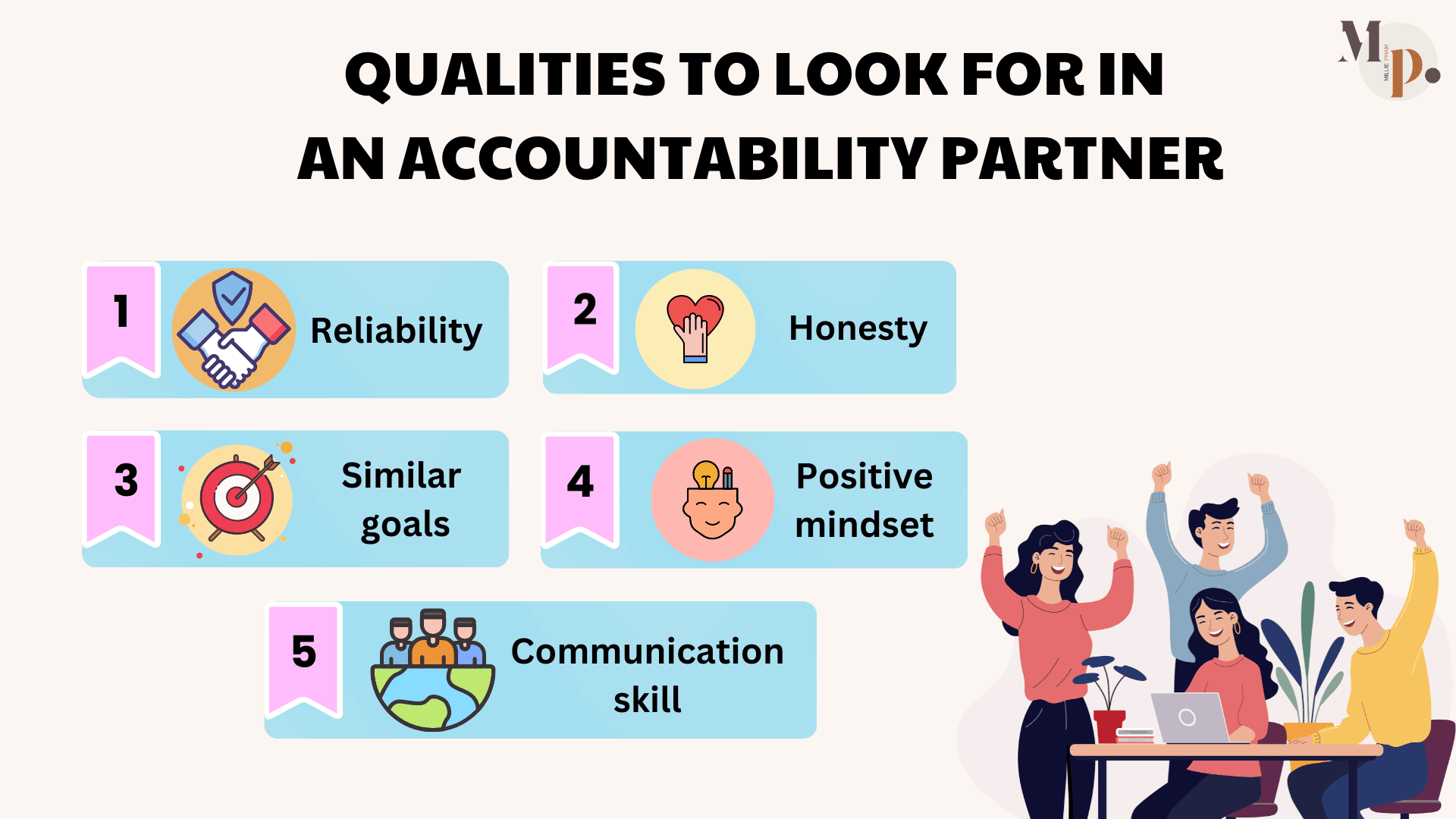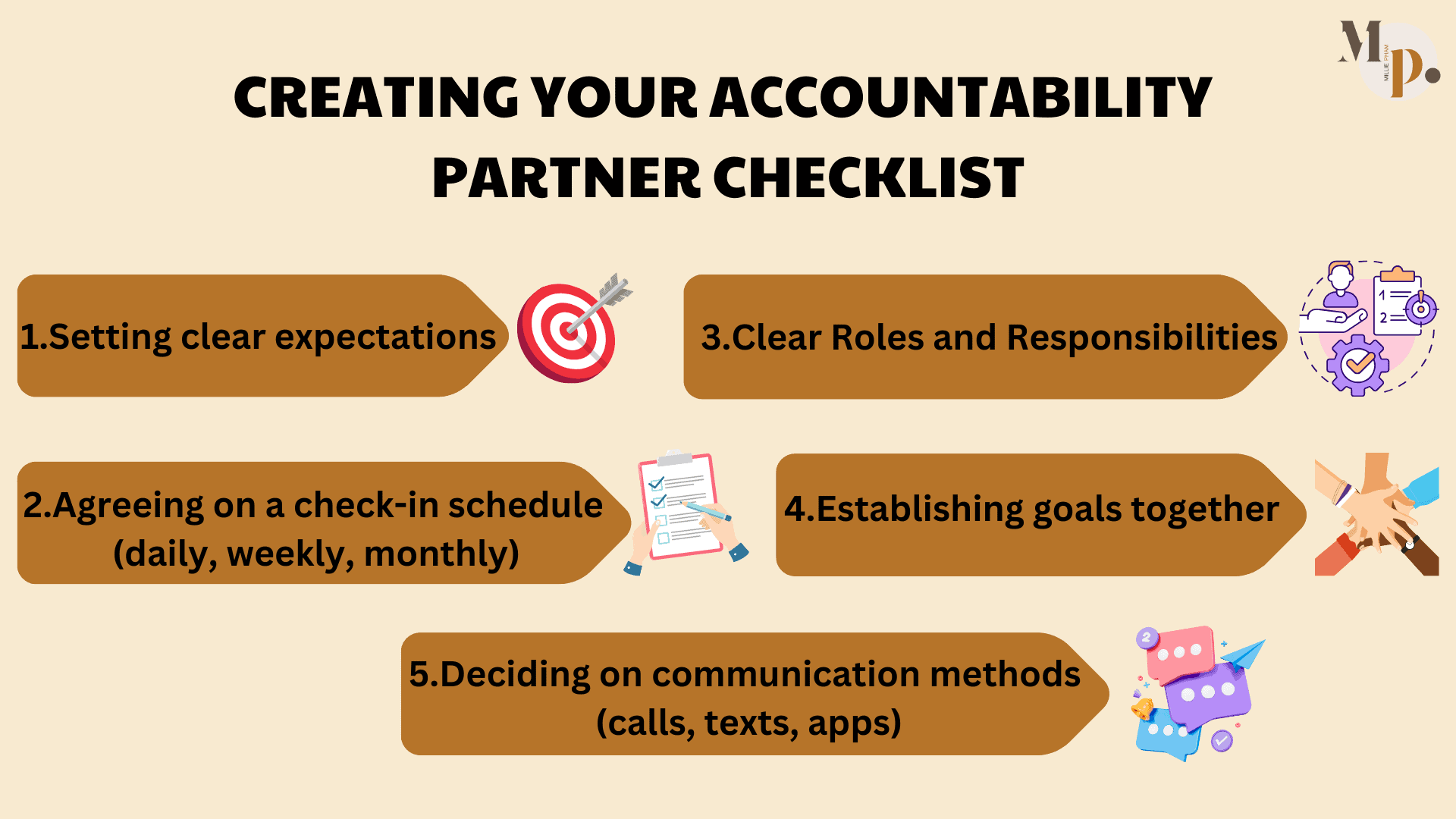Choosing the right accountability partner can make a huge difference in achieving your goals.
In fact, studies show that having a supportive buddy can increase your chances of success by up to 65%!
But how do you make sure you pick the best person for the job? That’s where this accountability partner checklist comes in.
Whether you want to build new habits, stay focused on personal projects, or achieve professional goals, this guide will help you find the perfect partner who’s just as committed as you are.
Ready to find your ideal accountability buddy? Let’s get started!
Why You Need the Right Accountability Partner

Choosing the right accountability partner can make a huge difference in reaching your goals.
When you have someone close who truly understands your goals, it's much easier to stay focused and motivated.
The right partner will support you, encourage you, and help you keep moving forward, even when things get tough.
[Research shows that having a specific accountability partner increases your chances of achieving your goals by up to 95%.
On the other hand, if you choose the wrong person, it can actually slow you down or distract you from what you’re trying to achieve.
That’s why it’s so important to find someone who’s committed and ready to work towards your goals with you.
When you hold each other accountable, you’re more likely to stick to your plans and succeed together.
Qualities to Look for in an Accountability Partner

Reliability
Reliability is one of the most important qualities in an accountability partner. You need someone who shows up consistently because that's what keeps you on track.
When your partner is reliable, you know they'll be there to check in, offer support, and keep you focused.
This consistency matters—a study from the American Society of Training and Development found that people are 65% more likely to meet their goals when they commit to someone else.
So, if you want to make real progress, choose a partner who always follows through.
Honesty
Honesty is a must when choosing an accountability partner. You need someone who isn’t afraid to tell you the truth, even if it’s not what you want to hear.
Open and constructive feedback helps you see where you’re doing well and where you need to improve.
In fact, a study found that 72% of people believe their performance improves when they receive honest feedback.
Having a partner who’s honest means you’ll get the support you need to stay on track and reach your goals faster.
Similar goals
Finding an accountability partner with similar goals is essential.
When you share the same vision, it’s easier to understand and support each other’s journey.
Having someone who’s aiming for the same target keeps you motivated and on track.
By choosing a partner who’s on the same page, reaching your goals becomes much more achievable.
Positive mindset
A positive mindset is a key quality to look for in an accountability partner. You want someone who encourages you, even when things aren’t going perfectly.
A partner with a positive attitude helps you stay motivated and reminds you to keep going, especially on tough days.
Research by psychologist Carol Dweck has shown that people with a growth-oriented and positive mindset are more likely to achieve success in their goals.
When your partner believes in you and stays upbeat, it’s easier to stay focused and make progress together.
Communication skills
Good communication skills are essential when choosing an accountability partner.
You want someone who can check in consistently and express their thoughts clearly. This makes it easier to stay aligned, ensuring you both understand the progress being made.
By choosing someone who communicates well, you'll find it much easier to stay motivated and focused on reaching your goals together.
Creating Your Accountability Partner Checklist

Setting clear expectations: What do you need from your partner?
Setting clear expectations is one of the first things you should do when choosing an accountability partner. It’s important to be upfront about what you need from them.
- Do you want regular check-ins?
- Honest feedback?
- Or maybe just someone to cheer you on when you reach a milestone?
By telling your partner exactly what you expect, you make it easier for both of you to stay on track and avoid misunderstandings later.
When you both know what’s needed, you’re more likely to work together effectively and reach your goals faster.
Clear Roles and Responsibilities
Defining roles and responsibilities is a must when working with an accountability partner. Both of you need to know what’s expected so you can support each other effectively.
For example, one of you might be in charge of setting up weekly check-ins, while the other tracks progress on goals. Or maybe you'll both take turns leading your sessions.
When you clearly outline who does what, it helps prevent confusion and keeps everything running smoothly. This way, you can both stay focused on your goals and work together as a team.
Agreeing on a check-in schedule (daily, weekly, monthly)
Agreeing on a check-in schedule is really important when working with an accountability partner. You need to decide how often you’ll connect—daily, weekly, or monthly.
This helps both of you stay on track and make sure you’re sticking to your goals.
For example, if you check in daily, you can talk about small wins or challenges you faced that day.
A weekly check-in might be better for bigger goals, while a monthly one could work if you have long-term plans.
Picking a schedule that works for both of you keeps things organized and makes it easier to stay committed.
Establishing goals together
You and your partner need to sit down and talk about what each of you wants to achieve.
This way, you both know what you’re working towards and can support each other better.
Start by sharing your main goals, then break them down into smaller steps. Make sure your goals are clear and realistic, so you can track your progress easily.
When you set goals together, it helps you stay focused and gives you a clear path to follow, making it much easier to stay on track.
Deciding on communication methods (calls, texts, apps)
Deciding on how you’ll communicate with your accountability partner is really important. Some people prefer quick text messages, while others like having longer chats over the phone.
You might even want to use apps like WhatsApp, Zoom, or Google Meet to keep things organized. The key is to pick the best method for both of you.
This way, you’ll always be able to stay in touch and check in on your progress. Clear communication makes it much easier to support each other and stay on track with your goals.
Questions to Ask When Choosing Your Accountability Buddy

When choosing your accountability buddy, it’s important to ask the right questions to make sure you’re a good fit.
Start by finding out what their goals are and see if they align with yours. It’s easier to work together when you have similar goals.
Next, ask how they handle setbacks or challenges. You want someone who doesn’t give up easily and can bounce back.
Also, find out if they’re comfortable being honest and giving you tough feedback when needed—that’s how you’ll grow.
Finally, ask how they prefer to communicate and check in, whether it’s through texts, calls, or weekly meetings. This helps make sure you’re both on the same page from the start.
Red Flags to Watch Out for When Selecting a Partner

Inconsistent communication or follow-through
Inconsistent communication or follow-through is a big red flag when choosing an accountability partner.
If they don’t respond to your check-ins or often miss scheduled meetings, it’s a sign they might not be fully committed.
An accountability partner needs to be reliable and show up when they say they will. It’s hard to stay on track and feel supported if they're not consistent.
This could slow down your progress and make it tougher to reach your goals.
So, if you notice early on that they’re not keeping their promises, it might be time to find a more dependable partner.
Ngative or discouraging attitude
A negative or discouraging attitude is a major red flag when picking an accountability partner.
You want someone who lifts you up, not someone who makes you feel bad about your progress.
If your partner constantly criticizes or doubts your efforts, it can drain your motivation and make it harder to stick to your goals.
A good accountability partner should be there to support and encourage you, even when things aren’t perfect.
If they’re always negative or quick to put you down, it’s a sign they’re not the right match for helping you reach your goals.
Lack of interest in personal growth
A lack of interest in personal growth is a clear red flag when choosing an accountability partner. You want someone who’s not just focused on your progress but is also committed to improving themselves.
If your partner isn’t interested in setting their own goals or growing alongside you, they might not be as motivated to keep you on track. This can make the partnership feel one-sided and unbalanced.
A good accountability partner should be just as excited about reaching their own goals as they are about helping you reach yours.
If they’re not, it might be time to find someone who truly values personal growth.
Different priorities or goals that don’t match your own
If your partner is focused on something completely different, it can be hard to stay on the same page.
For example, if you aim to improve your health but your partner is only interested in career goals, you might struggle to connect and support each other properly.
This mismatch can make it tough to stay motivated and could even slow down your progress. It’s important to find someone who shares similar goals, so you can work together and stay focused on what matters most to both of you.
How to Test Your Potential Accountability Buddy

Testing your potential accountability buddy is a smart way to see if they’re the right match for you.
Start with a trial period, like a couple of weeks, to find out if you work well together. During this time, set a simple, short-term goal that both of you can focus on. This will help you see how they support you and if they keep you motivated.
Pay attention to how they check in, encourage you, and handle any challenges.
At the end of the trial, take some time to review how things went and discuss if you want to continue working together. This way, you’ll know if they’re the right partner to help you reach your goals.
What to Do If Your Accountability Partner Isn’t Working Out

Recognizing when the partnership isn’t effective
Recognizing when your accountability partnership isn’t working is important, even if it’s not always easy.
If you notice that your partner isn’t following through, misses check-ins, or doesn’t offer support when you need it, it might be a sign that things aren’t going well.
You might also feel like you’re not making progress or that the partnership feels one-sided. These are clear signs that the partnership isn’t as effective as it should be.
It’s okay to admit when it’s not working; recognizing the problem is the first step toward finding a better solution or a new partner who’s a better fit for you.
How to communicate concerns or issues
If your accountability partner isn’t working out, it’s important to communicate your concerns in a clear and kind way.
Start by choosing the right time to talk when both of you aren’t rushed or distracted.
Be honest but gentle—focus on how you’re feeling rather than blaming them. For example, say, “I’ve noticed we haven’t been sticking to our check-ins, and I’m worried it’s affecting our progress,” instead of pointing fingers.
This opens up a conversation without making them feel attacked. Listen to their side too, and see if you can find a way to improve things together.
Clear and honest communication can make a big difference.
Tips for ending the partnership respectfully and moving on
If you need to end the accountability partnership, it’s important to do it respectfully.
Start by being honest and clear about why it’s not working out. You can say something like, “I think we might have different goals or needs, and I feel it’s best if we both move on.”
Be kind and thank them for their effort and support up to this point. It’s okay to let them know you appreciate the time you spent working together.
Avoid blaming or arguing—just focus on the fact that it’s not the right fit. This way, you both can move forward without hard feelings.
Finding a new accountability buddy who’s a better fit
If your current accountability partner isn’t working out, that’s okay. Sometimes, you need a better fit.
Try GoalsWon, an accountability partner platform that pairs you with a real coach who checks in daily to keep you on track. The coaches offer personalized support, help you stay motivated, and can be switched if needed.
The app also lets you set daily goals, track progress, and even get reminders, making it easier to stick to your plans.
Whether you choose a friend or GoalsWon, finding the right support can make all the difference.
Conclusion
Choosing the best accountability partner can be a game-changer in reaching your goals, but it all starts with using the right checklist.
By following this accountability partner checklist, you’ll find a buddy who motivates you, keeps you on track, and helps you achieve more than you ever thought possible.
Remember, the journey to success is much easier (and more fun!) when you have the right partner by your side.
So, start your search today, and don’t settle until you find the perfect match!
More to read: 21 Real-world Examples of Accountability In The Workplace
